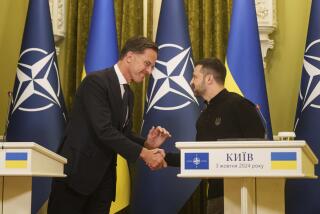With NATO Chief’s Visit to Russia, a Thaw Begins
- Share via
MOSCOW — Russia and NATO announced a formal resumption of contacts Wednesday, taking a big step toward thawing the iciest conflict between the alliance and Moscow since the end of the Cold War.
There is still a way to go to melt the frost, but Wednesday’s announcement was a signal that NATO is ready to do business with acting Russian President Vladimir V. Putin despite its concerns over the Kremlin’s war in separatist Chechnya.
The talks in Moscow between NATO Secretary-General George Robertson and top Russian officials, including Putin, paved the way for full meetings of the Permanent Joint Council, which brings together Russia and the 19 North Atlantic Treaty Organization allies.
Russia cut its ties with the Western alliance last March in anger over NATO’s bombing campaign against Yugoslavia, and Wednesday’s meeting came after a Russian invitation to Robertson.
“I think we’ve moved from the permafrost into slightly softer ground,” Robertson said after meeting with Russian Foreign Minister Igor S. Ivanov and Defense Minister Igor D. Sergeyev. The talks, he said, were very frank and even blunt. “It is generally agreed that we should move step by step in building up the dialogue.”
After meeting Putin later in the day, Robertson said the acting president had made it clear that pursuing the resumption of contact was his own initiative.
“I think he shared my view that the chilly period should come to an end,” Robertson said.
Important differences remain: Robertson criticized Russia over the war in Chechnya, in which many civilians have died, and he reported “quite a strong exchange of views” with Putin on the issue.
When NATO began its bombardment of Yugoslavia last year to punish President Slobodan Milosevic for his crackdown on ethnic Albanians in Kosovo--a province of Serbia, the main Yugoslav republic--it sparked virulent sentiment in Russia against the alliance and caused profound longer-term damage to the NATO-Russian relationship, much of which has yet to be repaired. The Russians and Serbs are longtime allies.
Several days after the bombing began, Russia sharply curtailed its contact with NATO. The Permanent Joint Council has continued to meet, but only to discuss issues surrounding NATO-Russian joint peacekeeping missions in Kosovo and Bosnia-Herzegovina.
Robertson’s visit to Moscow--the first by a NATO secretary-general since 1997--came amid growing charges of Russian atrocities against civilians in Chechnya, with the prominent rights organization Human Rights Watch saying it has documented 44 civilian killings in the last two weeks.
After a 40-minute meeting with Putin, Robertson said he had made clear NATO’s alarm over Russia’s war in Chechnya, a topic he said accounted for much of their discussion.
In an interview later on the Russian network NTV, Robertson said Putin had given him a welcome assurance that he would appoint an international observer to examine human rights issues in Chechnya. He did not elaborate.
Putin rode to popularity in Russia mainly because of his tough prosecution of the Chechen war, and he is seen as almost certain to maintain power after a presidential election March 26. With his ascension almost in sight, both President Clinton and Secretary of State Madeleine Albright have made it clear they see Putin as a figure they can work with.
Some analysts said the resumption of ties between NATO and Russia as war continues in Chechnya will be interpreted in Russia as a Western endorsement of Putin despite the war.
“Robertson’s visit sends a clear signal that the West has taken a decision to close its eyes on what is going on in Chechnya and place its bet on Putin as the next president of Russia,” said Andrei A. Piontkovsky, director of the Moscow-based Independent Institute for Strategic Studies. “This is just more strong evidence that the West and Putin understand each other and are ready to trade human rights violations in Chechnya now for guarantees of order and stability in the near future.”
Commenting at the outset of his meeting with Robertson, Putin said the visit showed that NATO regards its relations with Moscow as highly important. “On the other hand, these issues are not easy to tackle in Russia in the wake of the developments in Yugoslavia,” he said.
More to Read
Sign up for Essential California
The most important California stories and recommendations in your inbox every morning.
You may occasionally receive promotional content from the Los Angeles Times.










